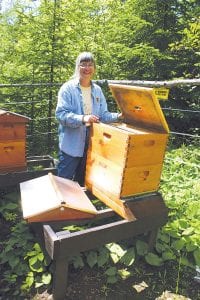“Beekeeping is very fun and cool!” That’s the word from Mark Ditmanson, one of a group of about a dozen and a half Cook County Hobby Beekeepers. The club started up last fall, and it has a mission, a rather big mission: help keep the honey bee alive and well so the worldwide food chain can continue to keep us alive.
The group met on June 15 to talk about its big project, which is to import bees from one of two mite-free honey bee zones in North America: Thunder Bay. Several of them showed off the wooden boxes they had made for transporting the bees across the border. You see, “for whatever reason, bees are in trouble,” Louise Reavis of Hovland explained. Two forms of mites have been killing off honey bees around the world, and many colonies are suffering from an unexplained malady called Colony Collapse Disorder. TheU.S. doesn’t have many honeybees left in the wild, Reavis said. She and her husband Dave have even planted fruit trees on their property in order to provide a good habitat for bees.

Janet Ditmanson standing by the beehive boxes in her family’s garden. In the two years they have kept bees, they have not harvested any honey, but they do enjoy watching them work. A not-completelyunderstood malady has been killing off honey bees worldwide, to the point where people in some places in China are using feathers to hand-pollinate fields, Janet said. Without honey bees, humans would be reduced to eating root vegetables and corn. The Cook County Hobby Beekeepers are working to make Cook County free of honey bee mites, one of the significant problems that is killing off bee colonies.
At the June meeting, Mark Ditmanson reported that another region in Canada — in British Columbia — has also been able to stay mite-free. Beekeepers in one area have actually expressed willingness to kill off all their bees in order to start over mite-free. (Since their current bees already have mites, they are doomed either way.)
Thunder Bay has a passionate group of honey bee keepers who are doing everything they can to keep this area free of mites. Some beekeepers simply try to deal with the symptoms through medication and poisons. Others strongly believe the healthy route, even for the humans who consume the honey, is to remain pest-free and organic, and they say poisons and medications are becoming increasingly ineffective, anyway.
The importance of healthy bees
Notes shared at a spring Cook County Hobby Beekeepers meeting include the following: “How is a bee like a canary? Just as canaries carried deep inside coal mines warned coal miners of dangerous conditions in the coal mine (the canaries became sick and died when exposed to underground pockets of methane gas or carbon monoxide), are honey bees today warning us of serious environmental dangers? Honey bee colonies are increasingly dying off and disappearing, causing increased concern from farmers and food scientists that we may not have enough bees available to successfully pollinate our food crops.
“…In the geographically isolated Thunder Bay District of Canada a farsighted beekeeper took steps to try and keep mites out of the area. This visionary, a trained scientist by the name of Jeanette Momot, became the district bee inspector and began an aggressive zero-tolerance program to keep the isolated area of Thunder Bay free of mites. Combining both persistence and education, Jeanette was able to achieve 100% cooperation from Thunder Bay beekeepers.”
Cook County Hobby Beekeepers
Cook County beekeepers also concerned about the growing threat to honey bees and convinced of the importance of preserving mite-free areas began to contact one another and develop a network that has resulted in the club. Its current initiative is to jump through the hoops, which include Canadian Food Inspection Agency bee inspectors and fees, to import mitefree bees from Thunder Bay. Theyexpect to be able to get bees across the border very soon. The Thunder Bay beekeepers aren’t even passing along all of their costs to the Cook County beekeepers.
Expanding the region of mite-free domestic honey bees from the Thunder Bay area down to Cook County could be a very important step for humankind as well as bees. The region’s unique geography and isolation make this a good place to keep colonies safe, as long as bees with mites can be kept away from the healthy ones. According to the Cook County Hobby Beekeepers, Lake County has some mite-afflicted colonies and Cook County has one.
Some of the Cook County Hobby Beekeepers already have mite-free colonies. Bill Wehseler has so far been the most successful beekeeper in the county. He has about 30,000-40,000 bees in three hives, and they each produce about one five-gallon pail of honey once a year. Keeping the bees alive over the cold winters is a major challenge, however. A lot of the locals lost their bees this winter, and they spent part of their June meeting strategizing how to keep the hives warmer in the winter.
Beekeeping is a noble venture, and some consider the end result a critical food source. “Beekeepers live longer than anybody,” Louise Reavis said, and honey is “very, very, very nutritious.” She is not alone in her belief that eating locally produced food helps people build their immune systems.
A partnership
The partnership between Thunder Bay and Cook County beekeepers will also help strengthen bee strains and make them more resistant to threats. Thunder Bay beekeepers are raising a variety of strains, and they will breed with the mite-free bees already in Cook County. Ditmanson told fellow beekeepers that the Thunder Bay group is a very fun group. “TheThunder Bay group goes to a really good hamburger joint!” he added. They had asked Ditmanson what the Cook County Hobby Beekeepers website address was (they don’t have one) and how much their dues are (they don’t have any) and said they want to join.
As of the June meeting, the Cook County Hobby Beekeepers hardly had a place to meet, but they did have live music. Theystarted out in the conference room in the Community Center, but when the Community Band started practicing, they had a hard time hearing each other, so they went outside and sat on a picnic table by the log building. When it started thundering, they didn’t seem to mind, but when the rain came down, they found shelter in the Curling Club rink. A fun time was had by all. Fun facts about bees › The Cook County Hobby Beekeepers will lure queens into the
transport boxes with pieces of candy that will plug up their quarters
while they travel. They will eat their way out of captivity.
› A queen is produced when a baby bee is fed royal jelly, a special
substance only for the queen’s consumption. Several new queens mature at the same time. They fight, and the winner gets to mate
with several drones, but she does this just once in her life. Drones
die right after mating.
› Sometimes the worker bees don’t like the queen.
› Other than the queen, bees come in two forms: workers (who
are females) and drones (who are males). Temperature makes the
difference in whether a baby bee will turn into a male or a female.
› A beehive has different areas for different uses. Bees take on
specific distinctly different roles: there are nurse bees (who take care of the young), guard bees, foraging bees, and scout bees, for example. A scout bee will return to the hive and wiggle her tail in a certain direction, intensity, and speed to indicate where she has found pollen. › The queen is the only bee that can sting a person again and again.
All the others die when they sting. They are actually giving up their
lives for the colony rather than protecting themselves when they
sting.
› Worker bees live about five weeks. “They literally work themselves
to death,” said Dave Reavis.
› Some African bees in Central America have been breeding with
other bees, creating a very prolific and less aggressive strain.
› Haagen Daas, the Dutch ice cream company, has launched a
campaign to promote the return of beekeeping to urban areas. Bee
references can be spotted in their TV ads.
› Some people consider commercially produced, pasteurized honey
to be less flavorful than honey from local fields and wildflowers.
› Beekeeper Simon Hoad wrote in a 2010 edition of Bayview
Magazine
that in the last two years, Colony Collapse Disorder has decimated 50-80% of commercial beehives in America.
› Attempts are being made to breed mite-resistant bee strains.



Loading Comments